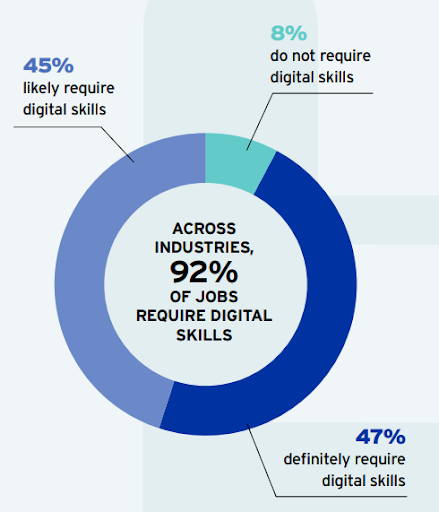National Career Development Month has C4C reflecting on the opportunity to re-evaluate the pathways available to students as the workforce continues to be shaped by emerging technologies and artificial intelligence (AI). Research from the National Skills Coalition reveals that the labor market has an overwhelming demand for digital skills, with 92% of all jobs requiring some level of digital proficiency across every industry, including entry-level positions. This demand creates an economic equity issue when students are not encouraged to pursue, or do not have access to, computing education. Workers who gain just basic digital skills see an average pay increase of 23%. Those with three or more essential digital skills earn an average of 45% more. When we advise students to develop foundational skills such as data literacy, digital literacy, and cyber safety, we are preparing them for the job market and empowering their economic mobility.

The rise of technology, particularly generative AI, necessitates career advising to adapt and emphasize the need for expertise that can meet the computational demands of future jobs, ensuring that every student possesses the necessary skills to succeed in a digital world. Our students need to transition from passive consumers of technology to thoughtful creators and informed users of technology. To support this, we must first model and teach students how to use AI safely and ethically, ensuring they know how to evaluate their use of AI critically. This preparation aligns directly with ASCA’s Student Standards: Mindsets & Behaviors for Student Success, specifically B-LS 1: Critical thinking skills to make informed decisions, and B-LS 5: Media and technology skills to enhance learning. Students’ use of generative AI has intensified concerns over cognitive reliance and atrophy, decreasing students’ critical thinking and problem-solving skills. School counselors can help counter this by empowering their students and other educators in the building to prioritize analytical and conceptual competence through school-wide exposure to computational thinking and the prioritization of computing education.
The rise of technology, particularly generative AI, necessitates career advising to adapt and emphasize the need for expertise that can meet the computational demands of future jobs, ensuring that every student possesses the necessary skills to succeed in a digital world. Our students need to transition from passive consumers of technology to thoughtful creators and informed users of technology. To support this, we must first model and teach students how to use AI safely and ethically, ensuring they know how to evaluate their use of AI critically. This preparation aligns directly with ASCA’s Student Standards: Mindsets & Behaviors for Student Success, specifically B-LS 1: Critical thinking skills to make informed decisions, and B-LS 5: Media and technology skills to enhance learning. Students’ use of generative AI has intensified concerns over cognitive reliance and atrophy, decreasing students’ critical thinking and problem-solving skills. School counselors can help counter this by empowering their students and other educators in the building to prioritize analytical and conceptual competence through school-wide exposure to computational thinking and the prioritization of computing education.
NCWIT is committed to promoting inclusion in the technology sector through our programs and research. Our mission to help organizations remain competitive depends on creating environments where all students and employees can thrive and succeed. C4C recognizes that professional school counselors are vital partners in this mission. C4C provides resources and knowledge that empower counselors, career coaches, and educators to actively promote and expand computing and technology education to all learners. School counselors can broaden students’ views—and career horizons—by dispelling common misperceptions and stereotypes about what computing is and who “belongs” in it. C4C champions a CS+Passion model that showcases computing skills in every field. Whether a student aspires to work in healthcare, the arts, or manufacturing, technical and digital literacy are required. According to the 2025 Gallup Math Matters Study, which surveyed 5,136 U.S. adults, respondents identified the following areas in which they wish they had received more instruction during middle or high school:
- Data science: 21%
- Software: 20%
- Programming: 20%
This data clearly shows that advising students toward any career must now include computational literacy in their pathways to success.
You don’t have to navigate this digital transformation alone. Utilize C4C’s free resources such as our Intersecting Pathways Poster, AI Detectives poster and handout, and many more. Sign up for our monthly Connected Counseling Newsletter and stay informed about professional developments in your area. Alternatively, contact us to bring one to your district or region. By committing to promoting digital readiness this month, you are helping secure a future of opportunity for all of your students.